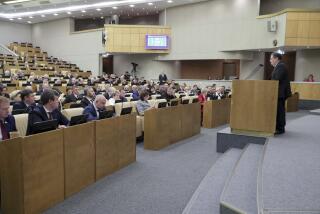Russia Legislators OK Tight Budget : Economy: IMF is expected to grant credit, even though plan fails to note ruble’s decline.
- Share via
MOSCOW — The lower house of Parliament completed a five-month exercise in voodoo economics Friday by adopting a 248-trillion-ruble Russian budget that was drawn up when Russia’s currency was worth almost twice what it is today.
Unrealistic as it is, passage of the tight, anti-inflationary spending plan for 1995 removed a major obstacle to a $6.3-billion credit from the International Monetary Fund to help Russia bridge a budget deficit and stay on good terms with other Western lenders.
Negotiations between Russian and IMF officials on conditions for the credit resumed here Friday.
One key requirement--a deficit of less than 8% of gross national product, with no inflationary financing--was met in Friday’s 273-93 vote by the Duma.
“This fully corresponds to the most strict requirements of the IMF,” First Deputy Prime Minister Anatoly B. Chubais said. “We have grounds to believe that talks with the (IMF) will be successful.”
The budget, which calls for $56 billion in spending and $39.5 billion in revenue, will go one more round in the Duma and one in the upper house, the Federation Council, with no substantive changes expected.
Western economists said the IMF will probably approve the credit next month, despite concern over the untallied costs of Russia’s war in Chechnya and a budget that, in the end, is inherently unstable.
President Boris N. Yeltsin’s government drafted the budget last September when the ruble traded at 2,300 to the dollar, and it made no adjustments as inflation eroded the Russian currency, which closed Friday at 4,429.
As a result, the Duma ended up working with artificially low ruble targets for income and spending that, economists say, will give way to new, destabilizing battles among farmers, miners, industrialists, the army and other groups as allotted funds end before the year does.
To enforce Russia’s pledge to refrain from printing money to stretch its resources, the IMF is expected to dole out the $6.3 billion in monthly installments and intensify its scrutiny of Russia’s books.
“Whatever the Duma votes to spend, whatever they say about the spirit of democracy in the new Russia, the government will have to adjust that figure to reality under the strong monitoring of the IMF,” said a senior economic specialist in Moscow.
Entering its fourth year of post-Soviet reform and still trying to get it right, Russia is becoming more dependent on the IMF and has already received from it $4 billion in loans.
Noting the IMF’s growing role, the Moscow newspaper Komersant said Thursday: “The vigilance of the IMF is spreading far beyond the boundaries of the budget.”
As a condition for the $6.3-billion credit, the IMF insists that Moscow liberalize foreign trade, particularly in oil exports, and eliminate tax exemptions for privileged organizations.
Free-market reformers leading Russia’s economy have agreed to do so but have met resistance from entrenched bureaucrats.
Responding to IMF disapproval, Yeltsin this week vetoed Duma legislation that would have raised the monthly minimum wage from $4.63 to $12.21 and upset budget calculations.
Many in the Duma, which first rejected the budget in November, said it was pointless to resist after the government refused repeatedly to change the broad outlines.
Friday’s vote followed hundreds of amendments to rejigger budget allocations.
The army, battered by the Chechnya war, got $10.5 billion and other security forces got $3.6 billion, compared to less than $1 billion each for education and social services. But $382 million was taken away from an amorphous category of bureaucrats and earmarked for scientific research.
*
“Proposals to improve people’s lives, to help the poor, were not widely supported,” said lawmaker Vladimir Medvedev, who voted against the budget.
Perhaps the biggest losers were the people of Chechnya, the tiny Muslim republic invaded in December by Russian troops and laid waste by bombing and artillery.
Economics Minister Yevgeny G. Yasin said no more than half a billion dollars will be available for reconstruction.
“We either have financial stabilization or restore Chechnya’s economy,” he said. “Financial stabilization has a priority here.”
Andrei Ostroukh of The Times’ Moscow Bureau contributed to this report.
More to Read
Sign up for Essential California
The most important California stories and recommendations in your inbox every morning.
You may occasionally receive promotional content from the Los Angeles Times.













